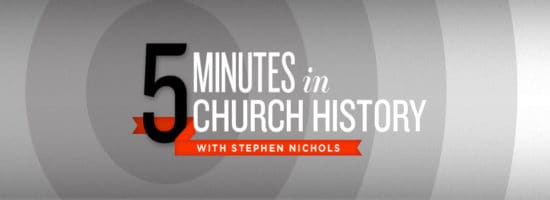
Liturgical Worship: The Most Important Thing to the Reformers?
Dr. Stephen Nichols: Today, I’m joined by Dr. Jonathan Gibson and Mark Earngey. We’re going to finish the conversation we started last week, just as I promised. Gentlemen, welcome back.
Rev. Mark Earngey: Thank you very much.
Dr. Jonathan Gibson: Good to be here again.
Dr. Nichols: It’s great to have you, not only because you both have accents, but because of this wonderful book, Reformation Worship: Liturgies from the Past for the Present. Last week, we ended the program talking about the role of a Word-centered worship with the Reformers.
Dr. Nichols: Now, I mentioned, as you look at the table of contents of this book, there are a lot of the usual suspects showing up from the Reformation in here. There are some names in the table of contents that some of our listeners might not know. So, tell us about one of these figures that we might not know but should know.
Rev. Earngey: We have Johannes Oecolampadius, with whom some of us are more familiar, and others of us should be familiar with. He was a really important Reformer from Basel, who wrote two liturgies that we’ve translated into English, I believe, for the first time. As you read these liturgies, not only do you get a feel for how Word based and Christ centered they are, but you get feel for the thought and care that crafted these liturgies. We spend a little bit of time introducing the liturgy in our book, explaining how Oecolampadius has had an influence on other Reformers, such as John Calvin, Heinrich Bullinger, and others. I think his influence can be seen in the liturgies that are in this book, that there’s a wonderful cross-pollination of liturgies. You’ll find the obscure people, perhaps whom you haven’t thought about, having profound influence on our worship in the Reformed tradition.
Dr. Nichols: There’s a Polish Reformer in here. Tell us about him.
Rev. Earngey: Johannes Alasco is an incredibly significant Reformer. He was a Catholic bishop, who became an evangelical, served the Lord Jesus in East Friesland and then came to England. He was brought to England by Thomas Cranmer during the English Reformation. He was the superintendent of the so-called Stranger Churches, the foreigner churches that Cranmer had set up in London for exiles from Continental Europe. There was a Dutch congregation, French congregations, and an Italian congregation; and Johannes Alasco was the bishop, or the superintendent, of those congregations. He was a hugely significant figure among the Reformers. He had connections with Bullinger, corresponded with Calvin, was used by Cranmer, and had a great impact on John Knox, among others—a really important figure.
Dr. Nichols: Thank you for not only bringing him to our attention, but also this great work of his liturgies. Dr. Gibson, let me ask you a question as we close out our conversation. You’re a professor of Old Testament. When we think of the Old Testament, we can’t help but think of the worship of a holy God. How did that influence the Reformers?
Dr. Gibson: Very much so. They viewed worship as vertical, primarily, rather than horizontal. Of course, they agreed that all worship that we do together in a corporate setting has edifying ramifications for us, but ultimately, they believe that God had made us as creatures made in His image. We were made to worship Him and enjoy Him forever. One of the ways we do that is that on the Lord’s Day we meet together to exalt Him and speak of what He is worth and why He is worthy of praise, thanks, and glory.
Dr. Gibson: So, as you read these liturgies, you see numerous things, but one of the things is just how God centered they are, and expanding on that, just how Trinitarian they are. Often, the prayers in nearly all of the liturgies will end with a Trinitarian formula: “Through Jesus Christ our Lord, your only Son, who lives and reigns with you and the Holy Spirit, one God, forever praised, world without end, Amen.” Reformation worship has a beautiful God-centeredness to it, and it’s hard to get away from it as you read these liturgies.
Dr. Nichols: Thank you, gentlemen, and thank you for this book, Reformation Worship: Liturgies from the Past for the Present.
Stay connected with 5 Minutes in Church History by getting the weekly podcast on iTunes, SoundCloud, or via RSS. You can also subscribe to the blog via RSS and follow us on Twitter and Facebook.
(This podcast is by Ligonier Ministries. Discovered by Christian Podcast Central and our community — copyright is owned by the publisher, not Christian Podcast Central, and audio is streamed directly from their servers.)